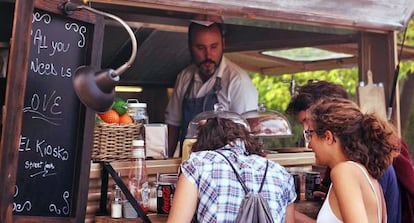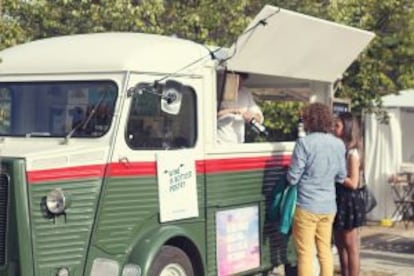How to set up a food truck in Spain
Becoming a mobile food vendor may be a challenge, but the trend is still growing


You might be passionate about cooking; you might even be good at it, and have the drive to make a living out of food preparation.
The next logical step, then, would be to open a restaurant. But the expense involved might not make it the most viable of options.
A more affordable solution would be to run a food truck. For as little as €15,000, you can buy a 1970s van that’s already been converted into a kitchen on wheels.
There are endless ways to turn a profit on the vehicle and the brand. You have to get creative”
José Miguel García, president of Street Food Madrid
The big problem in Spain, though, is the lack of national legislation: food truck owners have to pore over local regulations before planning their route, in order to find out what licenses are needed for each location.
“By the time trends come to Spain, it’s a case of too little, too late,” says Roberto de la Cuerda, 42, one of the pioneers of the food truck movement in Spain. “There’s still a long way to go before we are able to park and sell on any street, like you can in New York City.”
Two years ago, he first parked his vintage Citroën HY, known as El Kiosko, on a boulevard in Las Rozas, a residential town outside Madrid. Just two months later, he was already getting calls to come to food markets and other events.
Business has been brisk since then, and one of his biggest successes has been landing a sponsorship from the Mahou brewery. His prize dish is his hamburger on beer buns, followed by the “pedigree hot dogs” – sausages made by Schara, a Barcelona-based company that specializes in gourmet pork products.
Before embarking on your food truck adventure, some kind of restaurant experience is a must, warns De la Cuerda. You should also seek expert advice on legal matters and, above all, be aware that in some cases, just having the truck won’t do: you’ll need physical premises to act as a logistics center for the business.

“At some events, we’ve sold a thousand burgers in a single weekend,” he says. “If you think this can work with your home refrigerator and your own car for transporting the material, you’re really wrong.”
As a matter of fact, this Madrid-born entrepreneur owns not one but two restaurants. And anyone thinking of participating in the next edition of Madreat, the largest food truck event in Spain, should know that the Madrid health department requires all participants to have a production center based in the region.
In order to help entrepreneurs take their first steps, Basque chef Aitor Apraiz has launched a website called Food Truck Ya, which puts interested parties in touch with providers of vehicles and kitchen equipment, as well as with event organizers in different parts of the country.
The site’s recommendations, and those of other experts on the matter, form the basis of the following guide:
1. Decide what you want to cook. Liquid croquettes? Sounds good, but maybe you’re not quite familiar with the technique. It is important to define your menu, and ensure that you are comfortable with it. “There are as many food trucks as there are culinary personalities,” says Aitor Apraiz. You should pick your food truck according to the dishes you want to prepare. But beware of trouble with the car mechanics.
“A classic 1970s model may require a tow truck, since the mechanics are not fit for long road travel. You should take that into account,” notes José Miguel García, president of the Street Food Madrid association. “Also, the vehicle has to be approved by traffic authorities, and any alterations must be registered on its technical specs sheet.”
2. Study the market and check the idea can work. If the idea is to sell gluten-free products, you have to make sure there is enough of a demand for them. This requires market research, not just an assessment of what others have done. It’s a good idea to rent a food truck for a weekend and participate in a food event. A company named Retrotrucks rents out models from the 1950s and 70s for €500 a day or €850 for a weekend. “There are endless ways to turn a profit on the vehicle and the brand. Events are only part of the business, but there are also weddings, music festivals, private premises and even deserted islands. You have to get creative,” says José Miguel García.
3. Crunch the numbers: investment, operating costs and revenues. There are three types of vehicles: trailers (the cheapest model), vintage trucks from the 1950s and 70s, and more modern vans. “The Citroën HY is the top-selling model. You can find one between 2.4- and 3.2-meters long starting at €30,000,” says Fátima Humanes, owner of Mundo Tracción, a company that restores and personalizes these kinds of vehicles.

Contacting a food truck owner and asking about costs and revenues would be the ideal move, but if this is not possible, Aitor Apraiz suggests attending a day-long event and observing approximately how many units get sold at participating food trucks.
4. Design a brand, create a website and stake out a presence on the social networks. This is one of the main differences from traditional street stands: creating a brand name and a logo is key. “Right now it’s really trendy to be a foodie, and people love to upload pictures of delicious-looking food. You need to take advantage of that,” says Apraiz.
José Miguel García adds: “You need to really work on your website and increase your followers on the social networks, and make sure they always know where you’re going to be.”
5. Find out about municipal and food-related legislation. “In some municipalities activities are limited to events and fairs, but there are others (in growing numbers) where the possibilities are much broader,” says José Miguel García, who is also a lawyer specializing in food issues at the law firm Montesinos Viejo.
On the food front, there are four issues to take into account: if you are going to sell processed products, you need to have an authorized establishment. Second, shipments and providers have to be identified. Third, processing and sales must meet sanitation requirements. Lastly, “it is absolutely essential to know your product and be able to inform consumers about allergens or processing systems that could lead to cross contamination,” he says.
English version by Susana Urra.
Tu suscripción se está usando en otro dispositivo
¿Quieres añadir otro usuario a tu suscripción?
Si continúas leyendo en este dispositivo, no se podrá leer en el otro.
FlechaTu suscripción se está usando en otro dispositivo y solo puedes acceder a EL PAÍS desde un dispositivo a la vez.
Si quieres compartir tu cuenta, cambia tu suscripción a la modalidad Premium, así podrás añadir otro usuario. Cada uno accederá con su propia cuenta de email, lo que os permitirá personalizar vuestra experiencia en EL PAÍS.
¿Tienes una suscripción de empresa? Accede aquí para contratar más cuentas.
En el caso de no saber quién está usando tu cuenta, te recomendamos cambiar tu contraseña aquí.
Si decides continuar compartiendo tu cuenta, este mensaje se mostrará en tu dispositivo y en el de la otra persona que está usando tu cuenta de forma indefinida, afectando a tu experiencia de lectura. Puedes consultar aquí los términos y condiciones de la suscripción digital.








































